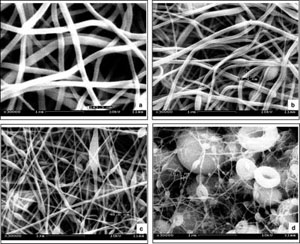Mar 16 2009
Researchers from New York are reporting production of the longest platinum nanowires ever made - an advance that they say could speed development of fuel cells for cars, trucks, and other everyday uses. The wires, 1/50,000 the width of a human hair, are thousands of times longer than any previously made, according to a report scheduled for the March 11 issue of ACS' monthly journal, Nano Letters.
 In an advance that could aid development of fuel cells, researchers are reporting the longest platinum nanowires ever made. Credit: The American Chemical Society
In an advance that could aid development of fuel cells, researchers are reporting the longest platinum nanowires ever made. Credit: The American Chemical Society
In the article, James C. M. Li and colleagues point out that short platinum nanowires already have been used in sub-microscopic sensors and other applications. With platinum the primary material used in fuel cells (which generate electricity cleanly from hydrogen and oxygen), scientists have sought to produce long wires from this precious metal. Those wires could be woven into the first self-supporting webs of pure platinum for fuel cell electrodes.
By a process known as electrospinning, the team made platinum nanowires long enough to construct that web. "Our ultimate purpose is to make free-standing fuel cell catalysts from these nanowires. This technology is a key step toward better solutions," says Li.